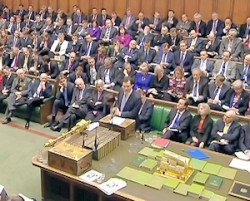UK Budget 2014 – What is in it for Broadband Internet Access?

The Government’s Chancellor, George Osborne, today set out his annual Budget 2014 report for the United Kingdom. Unfortunately anybody hoping for a significant boost to broadband investment, outside of what has already been announced, would have been very disappointed. In fact “broadband” is only mentioned once.
At present the Government’s Broadband Delivery UK (BDUK) and related projects, which are broadly overseen by MP Maria Miller’s Department for Culture Media & Sport (DCMS), aims to make fixed line superfast broadband (25Mbps+) services available to 95% of the population by 2017 (rising to 99% by 2018 when you include Mobile Broadband and other wireless solutions).
Advertisement
The immediate funding breaks down as follows, although it’s important to stress that these are just the headline UK schemes and there have been various other / smaller regional initiatives too, such as the recently replaced Broadband Support Scheme (here) in Wales etc.
On top of that it’s worth pointing out that local councils and the private sector (e.g. BT) are often required to match-fund with any investment from the central government / tax payers, which when combined with the figures below will often more than double the total investment. Additional funding has also come from various related EU initiatives (e.g. £53.5m in support of the Superfast Cornwall deployment).
Funding for Broadband in the UK
1. Broadband Delivery UK – (£780m + Contingencies [£830m])
This aspect primarily focuses on extending the coverage of mainstream fixed line superfast broadband out to reach 95% of people in each local authority area. So far BT has scooped up all of the related contracts in Wales, Scotland, N.Ireland and England; that trend currently shows no sign of any change.2. Urban Broadband Fund (Super-Connected Cities) – (£150m Approx)
This was originally intended to expand the coverage of “ultra-fast” fixed line broadband (80-100Mbps+) and “high speed” public wifi services into neglected areas of 22 large and smaller cities (here and here). But following EU competition concerns the ultra-fast infrastructure aspect, which accounted for most of the investment, was changed into a weaker Connection Vouchers scheme for businesses (here).3. Mobile Infrastructure Project – (£150m)
This originally aimed to help “at least” 98% of UK people gain access to a Mobile Broadband service by the end of 2017, although most of the major 4G and 3G based mobile providers expect to achieve this goal by the end of 2015. But reaching that last 1-2% is a huge challenge that has yet to be addressed.4. Rural Community Broadband Fund – (£20m)
This was originally setup to help farmers and remote rural communities in the last 5-10% of the UK gain access to superfast broadband by offering special grants for fibre optic focused community projects. But EU state aid rules prevent overbuilding with an existing NGA network and the lack of coverage info. from the BT dominated BDUK scheme, which conflicts with some of the proposed RCBF projects, has resulted in a large number of related grants being stalled (with the odd exception here and there).5. Competitive Fund – (£10m)
Similar to the RCBF approach, this batch of funding aims to “test innovative solutions to deliver superfast broadband services to the most difficult to reach areas” and appears to focus on fixed wireless, satellite and mobile operators (here). But fixed line services will also be considered.
So, in-between all of the characteristic heckling that seems to pervade such announcements (though it wasn’t quite so bad this year) and which often appears solely designed to annoy the humble viewer, did broadband get any love in this year’s budget (beyond what has already been announced)? No.
No truly new money, no big announcements about how we’d fix the final 5% and no firm pledge to fix the competition concerns that so frequently surround the BDUK scheme. Instead the Full Budget 2014 Report contained a single mention of the word “broadband” and here it is in all its glory..
Advertisement
The UK Budget 2014 – Broadband Highlights
* Over 330,000 more premises have access to superfast broadband [i.e. under the BDUK scheme]
Yep, that’s your lot, not even a bit of spin. It should be noted that the 330k figure of premises passed is up from 273,731 premises on 31st December 2013. The current roll-out aims to pass 25,000 additional homes and businesses per week this spring 2014 and should then rise to 40,000 by summer 2014 (here).
Mark is a professional technology writer, IT consultant and computer engineer from Dorset (England), he also founded ISPreview in 1999 and enjoys analysing the latest telecoms and broadband developments. Find me on X (Twitter), Mastodon, Facebook, BlueSky, Threads.net and Linkedin.
« North Yorkshire UK Confirm Funding for 100% BT Fibre Broadband Cover
Sky to Launch UK Internet Download-to-Keep Movie Service »






















































Comments are closed